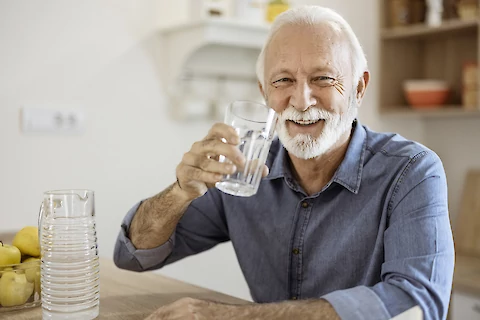
Staying hydrated can be a challenge for seniors. Ensuring adequate fluid intake is crucial for their overall health and for maintaining critical bodily functions. Explore some practical strategies for keeping your elderly loved ones hydrated.
Hydration in Seniors
The human body relies on water for nearly all its processes, and seniors are no exception. The body's ability to conserve water lessens with age, making seniors more susceptible to dehydration. Compounding this challenge, seniors often experience diminished thirst, which may lead to inadequate fluid intake. Certain medical conditions, prescription medications, and mobility issues can further complicate matters, creating unique challenges to hydration for the elderly.
Signs of Dehydration in Seniors
Dehydration in seniors can manifest in various ways. Common signs include:
- Headaches
- Dizziness
- Fatigue
- Confusion
- Dry mouth
- Skin that's flaky or less elastic
Notably, symptoms of dehydration in the elderly can often mimic those of other health conditions, making it sometimes challenging to identify. However, the impact on a senior's health can be severe, potentially leading to urinary tract infections, kidney problems, or even seizures. The earlier you recognize the signs, the better.
If seniors show severe symptoms like rapid heart rate, dry mouth or skin, or disorientation, immediate medical attention is necessary.
How to Help Seniors Stay Hydrated
Promoting hydration in seniors is not just about encouraging them to drink more water. It's also about offering appealing and varied hydration choices. Infusing their water with fresh fruits or offering herbal teas can make fluid intake more enticing. Additionally, several foods have high water content, including cucumbers, watermelon, and soups, which are excellent choices for seniors.
Creating a routine around fluid intake can also be beneficial. A glass of water may become a fixture alongside meals, or a cup of herbal tea could be a new nightly ritual. In an in-home care setting, these strategies can easily be adjusted to align with the senior's existing routines, making hydration a seamless part of their day.
How Caregivers Can Help Seniors Stay Hydrated
Caregivers play a pivotal role in keeping seniors hydrated, especially as thirst perception may change with age. Caregivers can help by:
- Regularly offering beverages
- Monitoring urine color for indications of dehydration
- Being vigilant about signs of dehydration
Professional caregivers are trained to support hydration in seniors. If you are concerned about dehydration, hiring a professional caregiver could help you monitor your loved one's water intake.
How Is Your Senior Loved One Staying Hydrated?
As we navigate the complexities of aging, let's prioritize hydration and help our seniors maintain their health and vitality. After all, aging brings its own set of challenges, but staying hydrated should not be one of them. With knowledge, planning, and a little help, we can ensure our seniors remain healthy and hydrated. The importance of hydration in seniors cannot be overstated, and caregivers' role in this aspect is equally significant. From understanding the unique hydration needs of seniors to recognizing signs of dehydration and implementing effective hydration strategies, caregivers are often the first line of defense in preventing dehydration in seniors.
If you reside in Princeton, Plainsboro, Princeton Junction, Hopewell, or Pennington and need assistance ensuring your elderly loved ones stay hydrated, contact us. Senior Helpers Princeton is committed to caregivers and ready to provide support.